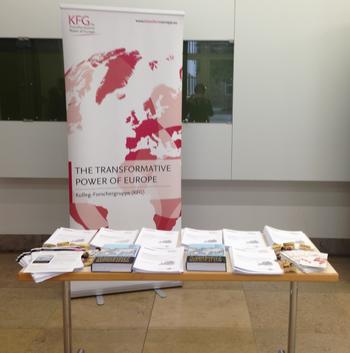Report: KFG at Dreiländertagung "Regionalismus in einer entgrenzten Welt" (Regionalism in a World without Borders)
Nov 30, 2016
From September 29 to October 1, 2016, KFG was present at the Dreiländertagung of German Political Science Association (DVPW), Austrian Political Science Association (ÖGPW) and Swiss Political Science Association (SVPW).
From September 29 to October 1, 2016, the KFG was present at the Dreiländertagung of German Political Science Association (DVPW), Austrian Political Science Association (ÖGPW) and Swiss Political Science Association (SVPW). The topic of the conference "Regionalism in a World without Borders" attracted not only the directors of the KFG but also several former and current fellows to take part. Furthermore, several of the authors of the Oxford Handbook of Comparative Regionalism, which was edited by KFG directors Tanja A. Börzel and Thomas Risse, attended. Fredrik Söderbaum, author of the chapter on Old, New, and Comparative regionalism in the handbook held the opening address of the conference. He highlighted the contributions of several scholars to the development of a comprehensive research agenda in the field of regionalism and pointedly described the waves of academic debate in the field. He also pointed out to three main shortcomings of current regionalism research, which he framed in three questions:
1) Where are the dark sides of regionalism?
2) What role does space play in regionalism research?
3) Where is Africa? (not as an object of research but as the origin of theories on regionalism)
During the conference days, KFG fellows and directors mainly engaged in section 1 and 2 of the program, including several subpanels. Section 1 dealt with basic problems of comparative regionalism research. Sub-panels included discussions on theories of comparative regionalism, diffusion, and overlapping regionalism. In section 2, scholars discussed function and performance of regional organisations. This section included sub-panels on various policy fields such as peace and security but also the role of regional organisations as unitary actors in international organisations, and inter-regional relations.
KFG organized an informal gathering for all former and current KFG fellows as well as handbook authors participating in the conference in the evening of September 30. The event sparked vibrant discussions and provided for interesting conversations. KFG was also represented at the conference with an information booth presenting the Oxford Handbook of Comparative Regionalism and the work of the KFG more generally, e.g. several working papers related to the topic of the conference.
Lisa van Hoof-Maurer
